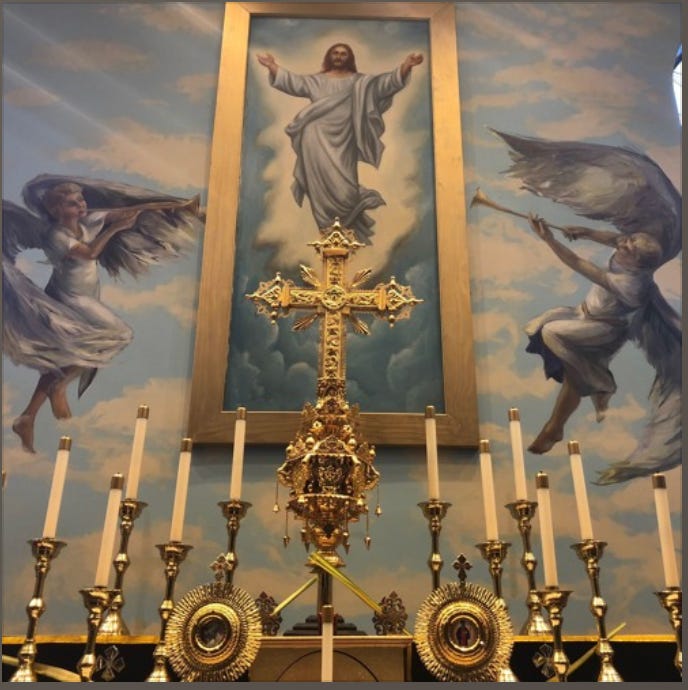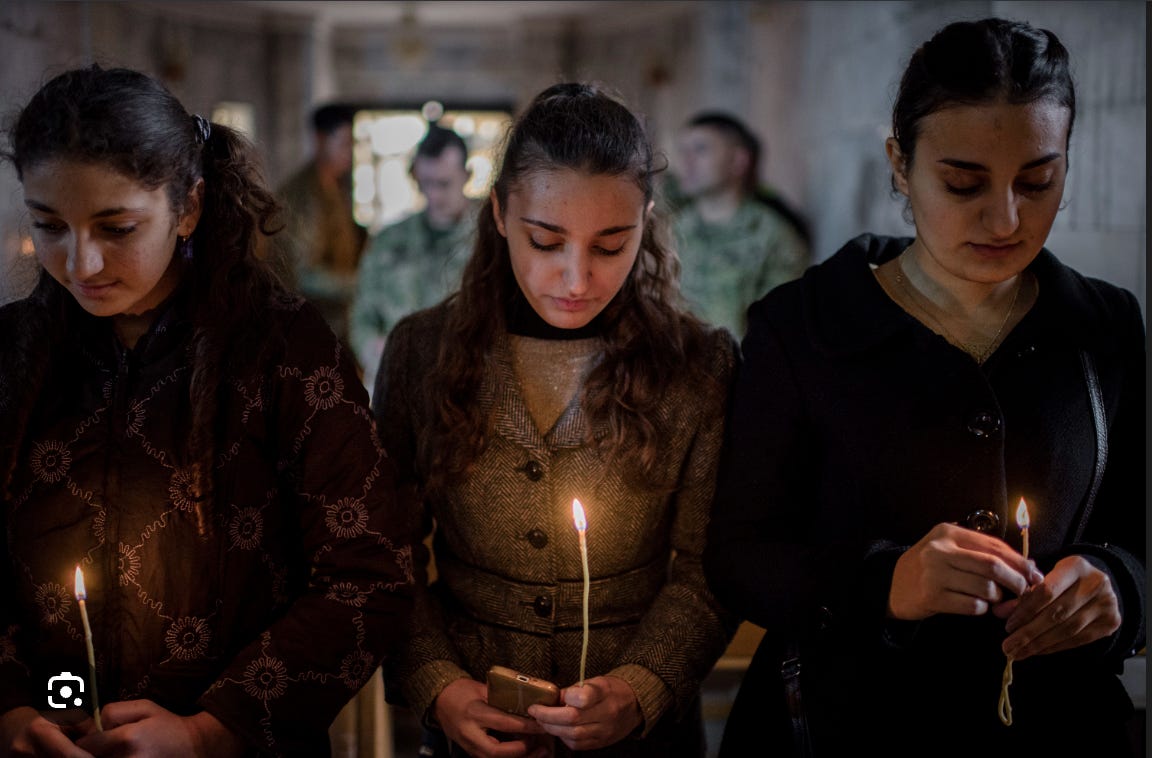On Inward Peace
"There is nothing better than peace in Christ, for it brings victory over all the evil spirits on earth and in the air. When peace dwells in a man's heart it enables him to contemplate the grace of the Holy Spirit from within. He who dwells in peace collects spiritual gifts as it were with a scoop, and he sheds the light of knowledge on others. All our thoughts, all our desires, all our efforts, and all our actions should make us say constantly with the Church: "O Lord, give us peace!" When a man lives in peace, God reveals mysteries to him.."
- St. Seraphim of Sarov
Daily Scripture Reading
2 Corinthians 9:12-10:7 (Epistle)
12 For the administration of this service not only supplies the needs of the saints, but also is abounding through many thanksgivings to God,
13 while, through the proof of this ministry, they glorify God for the obedience of your confession to the gospel of Christ, and for your liberal sharing with them and all men,
14 and by their prayer for you, who long for you because of the exceeding grace of God in you.
15 Thanks be to God for His indescribable gift!
1 Now I, Paul, myself am pleading with you by the meekness and gentleness of Christ – who in presence am lowly among you, but being absent am bold toward you.
2 But I beg you that when I am present I may not be bold with that confidence by which I intend to be bold against some, who think of us as if we walked according to the flesh.
3 For though we walk in the flesh, we do not war according to the flesh.
4 For the weapons of our warfare are not carnal but mighty in God for pulling down strongholds,
5 casting down arguments and every high thing that exalts itself against the knowledge of God, bringing every thought into captivity to the obedience of Christ,
6 and being ready to punish all disobedience when your obedience is fulfilled.
7 Do you look at things according to the outward appearance? If anyone is convinced in himself that he is Christ’s, let him again consider this in himself, that just as he is Christ’s, even so we are Christ’s.
Luke 4:1-15 (Gospel)
1 Then Jesus, being filled with the Holy Spirit, returned from the Jordan and was led by the Spirit into the wilderness,
2 being tempted for forty days by the devil. And in those days He ate nothing, and afterward, when they had ended, He was hungry.
3 And the devil said to Him, “If You are the Son of God, command this stone to become bread.”
4 But Jesus answered him, saying, “It is written, ‘Man shall not live by bread alone, but by every word of God.’”
5 Then the devil, taking Him up on a high mountain, showed Him all the kingdoms of the world in a moment of time.
6 And the devil said to Him, “All this authority I will give You, and their glory; for this has been delivered to me, and I give it to whomever I wish.
7 Therefore, if You will worship before me, all will be Yours.”
8 And Jesus answered and said to him, “Get behind Me, Satan! For it is written, ‘You shall worship the LORD your God, and Him only you shall serve.’”
9 Then he brought Him to Jerusalem, set Him on the pinnacle of the temple, and said to Him, “If You are the Son of God, throw Yourself down from here.
10 For it is written: ‘He shall give His angels charge over you, to keep you,’
11 and, ‘In their hands they shall bear you up, lest you dash your foot against a stone.’”
12 And Jesus answered and said to him, “It has been said, ‘You shall not tempt the LORD your God.’”
13 Now when the devil had ended every temptation, he departed from Him until an opportune time.
14 Then Jesus returned in the power of the Spirit to Galilee, and news of Him went out through all the surrounding region.
15 And He taught in their synagogues, being glorified by all.
Saint Eumenius, Bishop of Gortyna
Saint Eumenius from the time of his youth was noted for his virtuous life. He strove to serve the One God and therefore he shunned worldly temptations. Concerned for the salvation of his soul, he distributed all his substance to the poor.
By the blessing of God Saint Eumenius was chosen as Bishop of Gortyna on the island of Crete. The saint, like a compassionate father, comforted his flock in their sorrows, and cared for the orphaned and indigent. His prayers were so strong before God that once, during a drought, he called forth abundant rain upon the earth.
Saint Eumenius wisely and zealously defended the Orthodox Faith against the Monophysite heresy. For his opposition to the heresy the saint was banished to the Thebaid, where he died in the seventh century. His body was then transferred and buried in Gortyna.
The Orthodox Church and Peace
Some Reflections
By Olivier Clément
The spiritual and eschatological meaning that Scripture and Christ Himself give to the word "peace" characterizes the Orthodox Church as it does all Christian communities, although she is perhaps more wary than others of secularizing reinterpretations. The Biblical shalom which the Septuagint translates as eirene indicates the gift, the coming, the presence of God himself, for God is the one and only source of peace. The Messianic title 'Prince of peace' that we find in Proto-Isaiah applies in its fullness to Christ, the 'king of peace'.
In the New Testament, the 'peace of Christ' is a synonym for that life stronger than death which is brought to us by the Resurrection. Peace, life and joy are thus almost synonymous. 'Peace on earth', the message of the angels, is in fact accomplished by Christ -- and in Him -- for He reunites God and humanity by triumphing over death and hell. He 'makes peace by the blood of his cross'. In rooting Himself in the Church, Body of Christ, place of an ever-continuing Pentecost, the Christian, to the extent of his ascesis, an ascesis of trust and humility, is able to experience -- whatever the changes and chances of his life, despite 'wars and rumours of war' -- that deep peace which is the foreshadowing within him of the Kingdom. 'May the God of peace himself sanctify you wholly, and may your spirit and soul and body be kept sound and blameless at the Coming of our Lord Jesus Christ', writes St Paul to the Thessalonians. Similarly, Peter points to the 'gentleness' and 'peace' of the 'hidden man of the heart.'
Nevertheless this peace is not a withdrawal into oneself. Man is called to share in the very life of the Trinity: 'That they may be one, even as we are one,' said Jesus to His Father whom He has made ours. Our personal peace is realized in the peace of communion. The Christian, wherever he finds himself, has to become a peacemaker of human and cosmic existence -- 'Strive for peace with all men, and for the holiness without which no one will see the Lord', we are told in the Epistle to the Hebrews. The eucharistic community, which in the first centuries was called agape in Greek, caritas in Latin, ought to become, perhaps above all, a seed of peace in the world. The key text here is the Beatitude about the peacemakers, those who work to make peace -- who 'shall be called sons of God', adopted in the Son, therefore literally 'deified'. Thus the disciples of Jesus are 'to be at peace with one another' and with all men.
The first Christian communities are to be found in a 'universal' Empire which is a vast area of peace. They pray therefore for its preservation, while refusing to divinise the power of Rome and of the Emperor. But this refusal, which discloses the area of the free personal conscience between the Kingdom of God and that of Caesar, does not express itself through rebellion but through martyrdom, that is to say, through a non-violent stance, which has remained characteristic of the Christian East to this day.
The following text from the First Letter to Timothy has been almost entirely integrated into the eucharistic liturgies of St Basil and of St John Chrysostom which are still used today in the Orthodox Church: 'I exhort... that supplications, prayers, intercessions, and giving of thanks be made for all men, for kings and for all that are in authority, that we may lead a quiet and peaceable life in all godliness and honesty.' The Christians of the first centuries felt very strongly, as do many Eastern Christians today, that the Church covers the world through her presence and her prayer (Paul Evdokimov goes as far as to say that 'in the mystery' it is the world which is in the Church and not the other way around); that she preserves peace, delays the Parousia in its aspect of destruction, hastens it in its aspect of transfiguration.
'What the soul is in the body, such are Christians in the world', says the second century Letter to Diognetes. They sustain and support the world of which they are a fundamental element of its internal cohesion, life and peace. 'I have no doubt at all that it is because of the intercession of Christians that the world continues to exist', writes Aristides in his Apologia. Such is the priestly role of the entire Christian people, plainly indicated by the Sermon on the Mount: 'You are the salt of the earth,', which refers back to Leviticus: 'With all your offerings you shall offer salt,' and through to Revelation and the First Letter of Peter, which applies to the members of the Church the promise once made by the mouth of Moses to the chosen people: 'You shall be to me a kingdom of priests and a holy nation.'
This week’s calendar reminders:
Monday 9/16: Matins 8:30 a.m.
Tuesday 9/17: no services or events
Wednesday 9/18: no services or events
Thursday 9/19: Matins 8:30 a.m.; Men’s Group 7 p.m.
Friday 9/20: Matins 8:30 a.m.
Saturday 9/21: Women’s Group 9 a.m.; Catechumen Class 4:30 p.m; Choir Rehearsal 5:00 p.m.; Panikhida 5:45 pm; ; Great Vespers 6 pm
Sunday 9/22: Divine Liturgy 9: 15 a.m.












